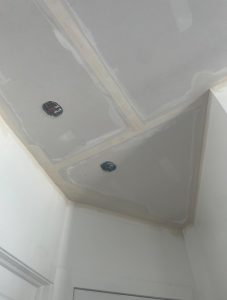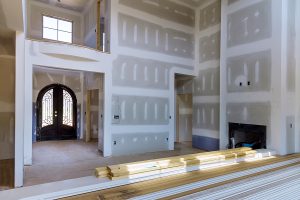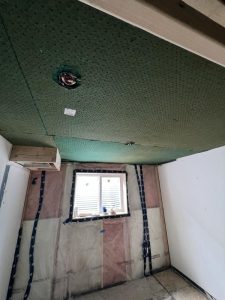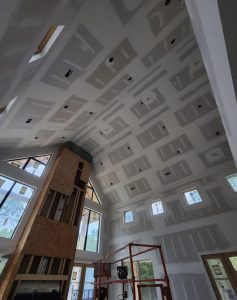Transforming your basement into a functional space can significantly enhance your home’s usability and value. However, one common challenge many homeowners face when utilizing their basement is unwanted noise. Whether you’re converting your basement into a home theater, recording studio, home office, or simply a quiet retreat, basement soundproofing is essential to ensure privacy, comfort, and noise reduction.
At Finest Finish, we specialize in professional drywall installation and soundproofing services, helping homeowners throughout Victoria and beyond create spaces that are both peaceful and functional.
Why Soundproof Your Basement?
Soundproofing isn’t just about quieting down a room—it’s about enhancing the overall comfort and usability of the space. A well-executed basement soundproofing project offers several benefits:
- Minimized noise from upper floors: If your basement is located beneath busy areas like the kitchen or living room, soundproofing can significantly reduce the noise from foot traffic, appliances, and conversations.
- Improved acoustic quality: If you’re setting up a home theater, a recording studio, or even just a quiet office space, soundproofing is crucial for controlling sound reflections and reverberations, improving sound quality inside the room.
- Increased home value: A soundproofed basement can add significant value to your home, making it more appealing to potential buyers, especially those who value multi-functional spaces.
Understanding the Basics of Soundproofing
Soundproofing isn’t just about blocking noise. It involves understanding how sound travels through walls, ceilings, and floors, and implementing strategies to minimize that transmission. There are four key principles to effective basement soundproofing:
- Mass: The heavier a material, the better it is at blocking sound. This is why double-layer drywall or thicker acoustic drywall is often used for soundproofing projects.
- Decoupling: By separating or decoupling structural elements (such as the drywall from the studs), you reduce the ability for sound vibrations to travel through walls and ceilings.
- Absorption: Acoustic insulation, like Roxul Safe’n’Sound, absorbs sound waves and prevents them from bouncing around the room, improving both sound quality and noise control.
- Damping: Green Glue and similar damping compounds reduce the amplitude of sound waves as they pass through walls or ceilings, converting sound energy into heat.
With these principles in mind, the role of drywall in soundproofing a basement becomes clear.
The Role of Drywall in Basement Soundproofing
While drywall alone won’t fully soundproof a basement, it’s a critical part of an overall soundproofing system. Combining drywall with other soundproofing materials and techniques enhances noise reduction and improves the comfort of your space. Here are the key ways drywall contributes to basement soundproofing:
- Double-layer drywall: Installing two layers of drywall with staggered seams significantly increases the wall’s mass, which reduces the amount of sound that can pass through. This is one of the most straightforward ways to improve soundproofing in any space.
- Resilient channels: These are metal channels that are attached to the wall studs, with the drywall mounted on top. Resilient channels decouple the drywall from the framing, reducing the transfer of sound vibrations between rooms.
- Green Glue: Applying Green Glue between two layers of drywall is a highly effective damping method. It absorbs and dissipates sound energy, preventing it from passing through walls. This makes Green Glue a popular choice in basement soundproofing projects.
Top Materials for Basement Soundproofing
In addition to drywall, several other materials can be used to create an effective soundproofing system. Below are some of the most effective soundproofing products for basement walls, floors, and ceilings:
- Sonopan: A soundproofing panel specifically designed to reduce airborne noise, Sonopan can be installed behind drywall to break up sound waves. It’s ideal for basement soundproofing, as it can be used on walls, ceilings, and floors to dampen noise from all directions.
- Mass Loaded Vinyl (MLV): MLV is a flexible but dense sound barrier that blocks airborne sound. It’s often installed under drywall, flooring, or ceilings, providing additional mass without adding significant thickness. This makes it perfect for basement soundproofing in homes where space is limited.
- Roxul Safe’n’Sound Insulation: Acoustic insulation is essential in soundproofing walls, ceilings, and floors. Roxul Safe’n’Sound is a high-density mineral wool insulation that absorbs sound and reduces transmission, making it a go-to choice for basement soundproofing.
Comprehensive Steps for Basement Soundproofing
Soundproofing your basement requires a multi-step approach to ensure maximum noise reduction. Here’s a step-by-step guide:
Frame the basement properly: The first step is ensuring the framing is done correctly. Consider using a staggered stud wall, where the studs are offset from each other. This prevents sound from traveling through the wall via a continuous path, improving the overall effectiveness of the soundproofing system.
Install acoustic insulation: Fill all the wall cavities, ceiling joists, and floor spaces with acoustic insulation like Roxul Safe’n’Sound. This insulation is designed specifically to reduce sound transmission and works best when paired with drywall installation.
Install resilient channels: Add resilient channels to the wall studs and ceiling joists before hanging drywall. The channels decouple the drywall from the framing, reducing sound vibrations and preventing them from passing through.
Double layer drywall with Green Glue: Apply a layer of Green Glue between two layers of drywall for maximum soundproofing efficiency. The Green Glue dampens sound vibrations, while the two layers of drywall provide mass to block noise. This technique is highly effective in basement soundproofing for spaces like home theaters or music rooms.
Seal all gaps: Small gaps around windows, doors, and electrical outlets can allow sound to pass through, undermining your soundproofing efforts. Use acoustic caulk to seal any gaps, ensuring that your drywall installation is airtight.
Soundproofing Basement Ceilings and Floors
To fully soundproof your basement, it’s important to address both the ceilings and floors, especially if noise from above or below is a concern:
- Acoustic drop ceiling: Installing an acoustic drop ceiling with soundproof tiles is a great way to reduce noise from the floor above. The additional layer of tiles helps absorb and block sound, making it a practical solution for basement soundproofing.
- Floating floors: A floating floor system can help minimize impact noise from footsteps. Acoustic underlayments like cork or rubber can be installed beneath flooring materials, reducing both impact and airborne noise.
Final Touches: Soundproofing Doors and Windows
To complete your basement soundproofing project, don’t forget to upgrade your doors and windows. Hollow-core doors allow sound to pass through easily, so consider installing solid-core doors for better soundproofing. Similarly, upgrading to soundproof windows or adding window inserts will prevent sound leakage. For extra noise control, seal the gaps around door and window frames with acoustic caulk.






